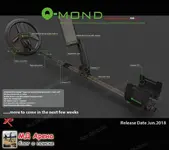I have to respectfully disagree with you re smartphone integration. As I said previously, smartphone integration (as a dedicated, continuous controller of anything) sounds and looks great on paper but rarely does it pan out in reality. I have used my smart phone to control my telescope, to control my lights, to control cameras in my house, to control my cable box, control a drone with FPOV, and to control my vid cam). For intermittent control applications such as TV remote control, security cam monitoring, etc., works great. However, in any application where you need CONTINUOUS, UNINTERRUPTED, control of a device (read, metal detector, video camera, telescope, drone), the phone or tablet can do it but ultimately fails miserably at the task in the long run. Primarily, because compromises need to be made in order for it to be used with a wide variety of hardware platforms even if the base software platform is common (e.g., android). Also, for those things where you need continuous control, using a multipurpose device as your platform is just asking for trouble. This became painfully evident when my drone flew off to la la land when I received a phone call (not answered) from home and when I lost the ability to control my telescope (at least until the telescope company came up with a new version of the telescope control app) due to a phone company mandatory security software upgrade. For metal detecting, I am now convinced that use of a dedicated, purpose built box (be it wired, wireless, or both) that is software upgradeable with the the features you need/want is definitely the way to go with some optional phone integration to provide enhanced functionality like site coverage tracking, finds cataloging, dig session video documentation, detector firmware update interface, and online manuals, documentation and info. But I always want to be able to revert back to the dedicated box if necessary and still be able to detect with the basic needed features to do so.






